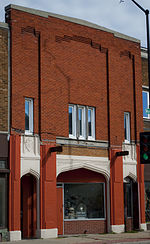George Murray House (Racine, Wisconsin)
Buildings and structures in Racine, WisconsinHouses completed in 1874Houses in Racine County, WisconsinHouses on the National Register of Historic Places in WisconsinItalianate architecture in Wisconsin ... and 1 more
National Register of Historic Places in Racine County, Wisconsin

The George Murray House (also known as the Our Savior's Lutheran Church Parish House) is a historic house built in 1874 in Racine, Wisconsin. It was added to the National Register of Historic Places on June 6, 1979. It is locally significant as one of the finest Italianate residences to be built in the Racine area during the 19th century.
Excerpt from the Wikipedia article George Murray House (Racine, Wisconsin) (License: CC BY-SA 3.0, Authors, Images).George Murray House (Racine, Wisconsin)
Washington Avenue, Racine
Geographical coordinates (GPS) Address Nearby Places Show on map
Geographical coordinates (GPS)
| Latitude | Longitude |
|---|---|
| N 42.713611111111 ° | E -87.805833333333 ° |
Address
Washington Avenue 2259
53405 Racine
Wisconsin, United States
Open on Google Maps





